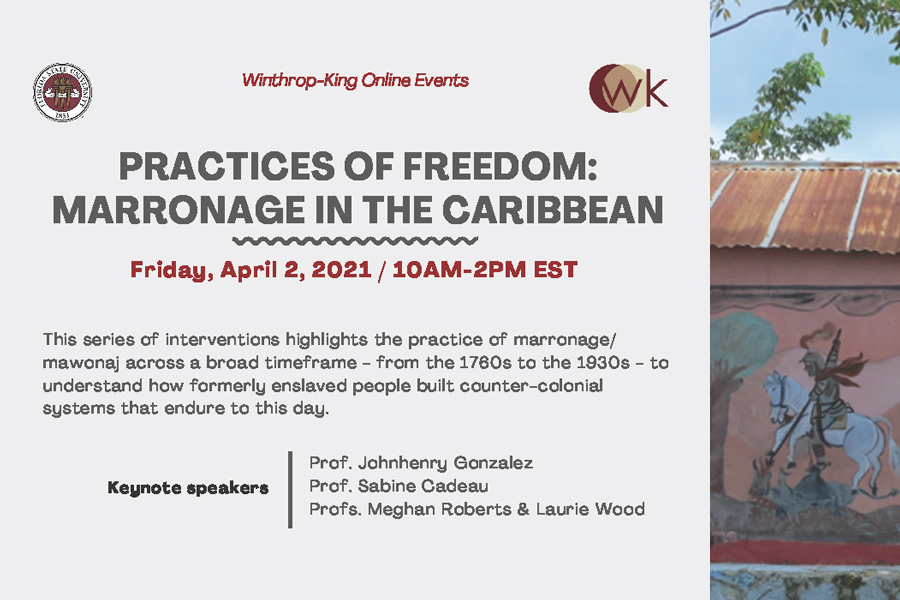Practices of Freedom: Marronage in the Caribbean

About the Event
As soon as the European colonization of the Americas began, resistance to it shaped the social, economic, and geographical landscape of the Caribbean. People who escaped slavery forged counter-colonial systems based on self-sufficiency, autonomy, and reciprocity that allowed them to live, think, believe, and imagine on their own terms.
This series of interventions highlights the practice of marronage/mawonnaj across a broad timeframe — from the 1760s to the 1930s — to understand how formerly enslaved people built counter-colonial systems, robust with counter-epistemologies and counter-cosmologies, that endure to this day. Dr. Wood and Dr. Roberts will present new research on Charlotte Dugée, a free woman of color and botanical illustrator who absconded with an enslaved woman from a French scientific expedition in Guyane in the 1760s. Dr. Gonzalez, author of the 2019 book "Maroon Nation" will discuss his argument about the ‘maroon’ character of Haiti’s early history. Dr. Cadeau will talk about the maroon-like survival strategies that emerged during the 1937 genocide in the Dominican Republic and its aftermath. In this presentation, she explores disturbing 20th century echoes of colonial Caribbean history.
The Winthrop King Institute for Contemporary French and Francophone Studies invites you to this one-day virtual event comprised of multiple elements. Since we cannot come together during this global pandemic, we decided to assemble an assortment of resources to enhance and contextualize the live events on April 2, 2021. Be sure to check the event website prior to the live sessions.
Sabine Cadeau, Ph.D. is a historian of the Caribbean and the broader African Diaspora. She is interested in histories of slavery, empire, race, citizenship and human rights. Her forthcoming book "More Than a Massacre: Racial Violence and Citizenship in the Haitian-Dominican Borderlands" is under contract with Cambridge University Press. "More than a Massacre" traces a successively worsening campaign of explicitly racialized anti-Haitian repression that began in 1919 under the American occupiers, accelerated in 1930 with the rise of Trujillo, and culminated in 1937 with the slaughter of an estimated twenty thousand civilians. Relatively unknown by contrast with contemporary events in Europe, the Haitian-Dominican experience has yet to figure in the broader literatures on genocide and statelessness in the 20th century. A parallel project, titled "Victims in Their Own Words: Remembering the Forgotten 1937 Haitian Massacre," is a documentary history based on interviews with massacre survivors and their descendants.
Cadeau is currently a postdoctoral fellow in the University of Cambridge Legacies of Enslavement Inquiry. Her current research explores the University of Cambridge’s historic connections to slavery and colonialism. She has been working with financial records and other sources in Cambridge libraries, colleges, museums, and other archives. At Cambridge she organizes regular public events on the legacies of enslavement and she organizes the "Slavery and Its Afterlives" seminar series hosted by the Legacies of Enslavement Initiative and the Centre of African Studies.
Cadeau received her Ph.D. in Caribbean Atlantic world history and Modern Latin America from the University of Chicago in 2015. From 2017 to 2019, she was visiting assistant professor in Caribbean history at the University of South Florida at Tampa. From 2016 to 2017 she was a postdoctoral fellow in Yale University’s Program in Agrarian Studies. From 2015 to 2016, she was a postdoctoral fellow at Rutgers University. Her research has been supported by the Andrew Mellon Foundation, The Social Science Research Council, and the Woodrow Wilson Foundation.
Johnhenry Gonzalez is a historian of the Caribbean with a primary focus on the history of Haiti. His work grows out of lengthy periods of research in Haiti and the Dominican Republic. He received his Ph.D. in history from the University of Chicago. He was a postdoctoral fellow at Duke and he worked for four years as assistant professor of Caribbean history at the University of South Florida at Tampa. His 2019 Book "Maroon Nation" explores the political economy of early independent Haiti. His second book project in progress considers the history of foreign influence in the 20th century Haitian art business. He is also currently in the early stages of his first archeological research project in Haiti. In the Cambridge history faculty he teaches on The Caribbean, Latin America, slavery and the African diaspora.
Meghan Roberts is associate professor of history at Bowdoin College and a specialist on the history of 18th century France, the history of science and medicine, and women's and gender history. She is the author of "Sentimental Savants: Philosophical Families in Eighteenth-Century France" and is currently working on a book about publicity, trust, and coercion in 18th century medicine.
Laurie Wood is an associate professor of history at Florida State University, where she teaches courses in Atlantic, Indian Ocean, Early Modern European, and world history. Her first book, "Archipelago of Justice: Law in France’s Early Modern Empire" (Yale Univ. Press 2020), evaluates the interwoven trajectories of the people, such as itinerant ship-workers and colonial magistrates, who built France’s first empire between 1680 and 1780 in the Atlantic and Indian Oceans. Current projects include “The Everyday Materials of Colonial Legal Spaces,” and Flickering Fortunes: Women, Catastrophe and Complicity in the French Tropics."
- 10:00 to 10:55 a.m. EST: Presentation and Discussion with professor Johnhenry Gonzalez
- 11:00 to 11:55 a.m. EST: Presentation and Discussion with professor Sabine Cadeau
- 12 to 12:30 p.m. EST: lunch break
- 12:30 to 2:00 p.m. EST: Presentation and Discussion with professors Meghan Roberts and Laurie Wood
Moderated by Vincent Joos and Martin Munro
